
Foro Internacional
Scope & Guideline
Fostering Global Discourse from a Latin American Perspective
Introduction
Aims and Scopes
- Interdisciplinary Analysis of Political Dynamics:
The journal focuses on the interplay between various political ideologies, governance structures, and public policies, particularly in Latin America. It examines how these factors influence democratic practices and citizen engagement. - International Relations and Global Governance:
Foro Internacional addresses issues related to international relations, including the impact of global events on local contexts, the role of Latin America in global governance, and the dynamics of geopolitical shifts. - Social Justice and Human Rights:
The journal emphasizes themes of social justice, human rights, and the complexities surrounding these issues in different sociopolitical environments, particularly in marginalized communities. - Critical Examination of Populism:
A significant focus is placed on the rise of populism in various contexts, analyzing its implications for democracy, governance, and public discourse. - Climate Change and Environmental Policy:
The journal explores the intersection of climate change, environmental policy, and social justice, particularly how these issues affect vulnerable populations in Latin America.
Trending and Emerging
- Impact of Populism on Democracy:
Recent publications show a growing focus on populism and its effects on democratic governance, reflecting global concerns about the erosion of democratic norms and the rise of authoritarianism. - Climate Justice and Environmental Challenges:
The journal has seen an increase in articles addressing climate justice, particularly how climate change disproportionately affects marginalized communities, highlighting an urgent need for equitable environmental policies. - Indigenous Rights and Global Politics:
There is a rising trend in research exploring the intersection of indigenous rights and international relations, emphasizing the role of indigenous voices in global political discourse. - Digital Politics and Misinformation:
As the impact of social media and misinformation becomes more pronounced, the journal is increasingly publishing on topics related to digital politics, including the role of technology in shaping public opinion and political outcomes. - Transnational Networks and Global Governance:
Emerging themes include the analysis of transnational networks and their influence on global governance, reflecting a shift towards understanding complex interdependencies in addressing global challenges.
Declining or Waning
- Traditional Theories of International Relations:
There has been a noticeable decrease in articles centered on classical theories of international relations, suggesting a move towards more contemporary and practical analyses of current political issues. - Historical Perspectives on Nationalism:
Research focusing on historical nationalism, particularly as it relates to Latin American identity politics, has become less frequent, indicating a potential waning interest in this area compared to more immediate political challenges. - Economic Theories in Global Contexts:
Papers discussing traditional economic theories, such as neoliberalism and its critiques, appear to be diminishing as the journal shifts towards more pressing social and political issues.
Similar Journals

PONTE
Enriching Academic Discourse with Diverse PerspectivesPONTE is a distinguished academic journal published by IL PONTE EDITORE, focusing on the interdisciplinary fields of Arts and Humanities as well as Social Sciences, specifically within Literature and Literary Theory and Sociology and Political Science. Despite its recent coverage discontinuation in Scopus, PONTE remains an essential platform for scholarly discourse, aiming to enrich the academic community with critical insights and diverse perspectives. Established in Italy, this journal offers a unique forum for researchers, professionals, and students to engage with contemporary issues, promote innovative research, and contribute to the evolving dialogue in the humanities and social sciences. While it does not provide Open Access options, the journal's content is pivotal for those seeking to deepen their knowledge and foster collaboration across disciplines. As the field continues to grow, PONTE's commitment to high-quality research ensures its historical significance and ongoing relevance in academic inquiry.
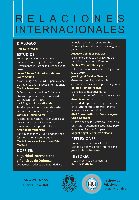
Relaciones Internacionales
Enhancing Understanding of Complex International IssuesRelaciones Internacionales is an esteemed academic journal focused on the field of international relations, published by the Universidad Nacional de La Plata, Faculty of Law & Science. Established in 1991, this Open Access journal aims to foster comprehensive discussions and disseminate high-quality research on global political dynamics, diplomatic relations, and international policies. By providing a platform for scholars and practitioners, Relaciones Internacionales enhances the understanding of complex international issues, making it a vital resource for researchers, professionals, and students in the field. With its commitment to accessibility and academic rigor, the journal contributes significantly to the growth of knowledge and practice within international relations and related disciplines.
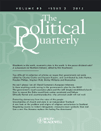
POLITICAL QUARTERLY
Connecting Researchers to the Pulse of Political SciencePOLITICAL QUARTERLY, published by Wiley, is a premier scholarly journal that has been at the forefront of political science and sociology since its inception in 1930. With an ISSN of 0032-3179 and an E-ISSN of 1467-923X, this esteemed journal boasts an impressive Q1 ranking in both the Sociology and Political Science categories as per the latest metrics. Positioned within the top 81st percentile of social sciences, it ranks #271 out of 1466 journals listed in this field according to Scopus. The journal publishes a diverse range of articles that explore critical political theories, empirical research, and contemporary societal issues, making it a vital resource for researchers, professionals, and students alike. While not currently offering open access, POLITICAL QUARTERLY remains committed to advancing knowledge and fostering scholarly dialogue within its disciplines. Located in the United Kingdom at 111 River St, Hoboken 07030-5774, NJ, it continues to shape discourse on political and social dynamics into its upcoming 2024 volume.
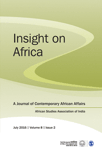
Insight on Africa
Navigating the Intricacies of African StudiesInsight on Africa is a distinctive academic journal published by SAGE Publications Ltd, focusing on the multidisciplinary aspects of African studies, including facets of development, history, and political science. With its ISSN 0975-0878 and E-ISSN 0976-3465, this journal serves as a vital resource for researchers, professionals, and students interested in the continent’s socio-political dynamics and historical contexts. Enjoying a reputable Q1 ranking in History and Q3 rankings in Development and Political Science and International Relations, Insight on Africa not only reflects a significant impact in its fields but also aims to foster scholarly discussions and promote knowledge dissemination related to contemporary African issues. While not an open-access journal, its commitment to rigorous academic standards and peer-reviewed content ensures that published research achieves broad recognition, making it essential reading for those engaged in African studies.

European Review of International Studies
Connecting Scholars to the Heart of International RelationsEuropean Review of International Studies is a premier journal published by BRILL, dedicated to advancing scholarship in the fields of Political Science and International Relations. With an ISSN of 2196-6923 and E-ISSN 2196-7415, it serves as a significant platform for rigorous academic discourse and contemporary research, currently holding a prestigious Q2 ranking in both Political Science and Social Sciences categories. The journal's scope encompasses a broad range of topics related to international studies, making it a vital resource for researchers, practitioners, and students alike who seek to deepen their understanding of global issues. Published from the Netherlands, the journal has been in circulation since 2014, contributing to scholarly dialogue through a worldwide readership and is indexed in prominent databases such as Scopus, where it ranks in the 41st-42nd percentile across its fields. By promoting open access to knowledge, the European Review of International Studies aims to enrich the academic community's exploration of pivotal global phenomena.
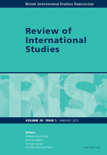
REVIEW OF INTERNATIONAL STUDIES
Elevating scholarly dialogue on international issues.REVIEW OF INTERNATIONAL STUDIES, published by Cambridge University Press, is a leading journal in the fields of Political Science and International Relations, with a robust focus on sociopolitical dynamics from a global perspective. Established in 1976, it has garnered a distinguished reputation, achieving a Q1 ranking in both Political Science and Sociology for 2023, underscoring its impact and relevance within the scholarly community. With an impressive Scopus ranking placing it in the 93rd percentile among peer journals in its field, this journal serves as an essential platform for researchers, professionals, and students engaged in critical analysis and discourse on international affairs. Although it does not currently offer Open Access options, the journal is committed to advancing knowledge through rigorous peer-reviewed research, contributing significantly to the academic dialogue surrounding global political issues.
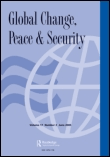
Global Change Peace & Security
Innovating Solutions for Global Security and CooperationGlobal Change Peace & Security is a prominent scholarly journal published by Routledge Journals, Taylor & Francis Ltd, focusing on the intricate interplay between global change and peace efforts within the realms of political science and international relations. With an ISSN of 1478-1158 and an E-ISSN of 1478-1166, this esteemed journal spans from 2008 to 2024, consistently contributing to critical discourse in its field. Ranked in the second quartile (Q2) for both Political Science and International Relations as well as Sociology, it occupies a distinguished position with a Scopus ranking of 134 out of 706 and a percentile standing of 81st in Political Science. The journal’s objective is to bridge the gap between theoretical frameworks and functional policy discussions, thereby fostering dialogue that addresses contemporary challenges in global governance and human security. By offering rich, research-based insights and analysis, Global Change Peace & Security serves as a vital resource for academics, practitioners, and policy-makers committed to advancing peace and security amidst pervasive global transformations.
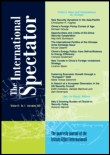
International Spectator
Navigating the Intricacies of International Relations.International Spectator, published by Routledge Journals, Taylor & Francis Ltd, stands as an eminent peer-reviewed journal in the field of Political Science and International Relations. Established in 1983 and continuing its impactful discourse through 2024, the journal boasts a commendable Q1 ranking in 2023, confirming its position among the top-tier journals within its discipline. With a Scopus ranking of 121 out of 706, it lies in the 82nd percentile, showcasing the robustness of its scholarly contributions. Although not designated as an open-access journal, International Spectator remains essential reading for researchers, professionals, and students seeking to navigate the complexities of international politics. The journal aims to publish high-quality research that engages with global political dynamics, providing a platform for innovative ideas and critical analyses that shape the understanding of international relations today.
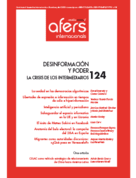
Revista CIDOB d Afers Internationals
Exploring contemporary issues through rigorous scholarship.Revista CIDOB d Afers Internationals is a distinguished academic journal published by FUNDACIO CIDOB, specializing in the fields of Political Science and International Relations. Since its establishment, the journal has embraced an Open Access model, allowing unrestricted access to its content since 1998, thereby fostering global dissemination and collaboration among researchers and professionals. Based in Barcelona, Spain, the journal is recognized for its rigorous scholarship, achieving a Q2 quartile ranking in the 2023 category of Political Science and International Relations. With a Scopus rank of #361 out of 706 in the relevant field, it operates within an impactful academic framework that encourages innovative thought and analysis from its contributors. The periodical hosts a broad array of articles that delve into contemporary global issues, making it an indispensable resource for students, academics, and practitioners seeking to deepen their understanding of international affairs. As the journal looks ahead, it continues to evolve, converging academic insight from 2016 to 2024 and beyond, inviting scholars to contribute to the ever-expanding discourse on international relations.
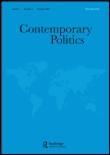
Contemporary Politics
Decoding the Nuances of International RelationsContemporary Politics is a distinguished academic journal published by Routledge Journals, Taylor & Francis Ltd, specializing in the fields of Political Science, International Relations, and Sociology. With an ISSN of 1356-9775 and an E-ISSN of 1469-3631, the journal has carved out a significant place in academia, evidenced by its impressive Q1 ranking in both Political Science and Sociology categories for 2023. The journal's impact is further underscored by its Scopus rankings, placing it in the top 15% of Political Science and International Relations journals and among the top 18% in Sociology. Covering a breadth of contemporary issues from 1995 to 2024, it strives to foster insightful discourse and innovative research that illuminates the complexities of modern political landscapes. While the journal is not open access, it remains an essential resource for scholars, policymakers, and educators seeking to explore critical political dynamics and social phenomena. Based in the United Kingdom, Contemporary Politics serves as a pivotal platform for disseminating research that contributes to the understanding of pressing global issues.